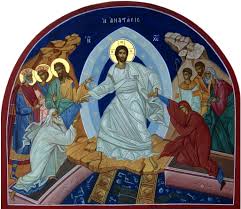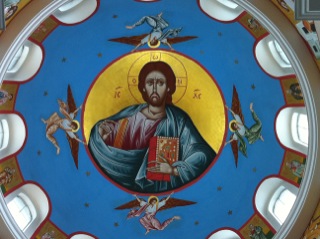
Life after Death
From the Orthodox Study Bible (Old Testament)
For the ancient Hebrews, death meant a return to the same earth from which all are taken: “For earth you are, and to the earth you shall return” (Gn 3:19; Job 7:21). Nevertheless, a general idea developed that the souls of the dead do continue, though only in a shadowy, semi-comatose kind of existence in a netherworld called sheol, or Hades (Gn 37:34, 35; Pss 114:3, 138:8; Is 14:9-11), a land of “oblivion” (Ps 87:10-12; Job 14:18-22). In sheol – the depths or abyss of the earth, “the Pit” – even the righteous dead abide, without any power of deliverance (Job 7:6-10; Ps 88:48; Is 38:18; Ezk 26:19-21). Yet there was at least a general hope that one’s memory would be kept alive by one’s community and descendants (Ps 111:1-6; Pr 10:7; Dt 25:5, 6).
Only gradually did God reveal glimpses of a glorious life after death to His people, a hope that would become available to all through the power of Christ’s Resurrection. An early hint of this coming hope was revealed to Job. Amid his terrible suffering, Job asks, “If a man dies, shall he live again?” And through a flash of divine insight, he says: “I will wait until I arise” (Job 14:14). Psalms also begin to reflect upon personal resurrection to everlasting life (Ps 15:8-11; 48:15; 70:20-23; 90:1-16).
The first indications of a corporate resurrection of the people of Israel are given in the 8th century BC through Hosea (Hos 6:1-3; 13:14) and Isaiah (Is 26:19). In the early 6thcentury BC, Ezekiel receives the dramatic vision of a miraculous reconstitution of “the whole house of Israel” on the plain covered with dry bones (Ezk 37:1-14). The Church reads this passage triumphantly on Great and Holy Saturday. Why? Because it is prophetic of the freeing of all the souls from Hades by Christ on that day (1Pt 3:19; Eph 4:8-10) and the general resurrection of all the dead on the last day.
By the late first century BC, as seen in the Wisdom of Solomon, immortality is directly linked with living in wisdom and righteousness: “Kinship with Wisdom is immortality” (WSol 8:17); “The righteous shall live forever” (WSol 5:15; see also 1:13-15; 2:22, 23; 6:17-21). Various passages from this book (WSol 3:1-9; 4:7-15; 5:15-6:3) are read at Vespers in commemoration of some of the more prominent saints.
At the time of Christ, the Sadducees rejected belief in an afterlife (see Mt 22:23), while the Pharisees did believe in resurrection and immortality (Acts 23:6-8). It was the Pharisees’ view which came to dominate in later Judaism. Lazarus’ sister Martha knew about a general “resurrection at the last day” (Jn 11:24), but Jesus declares to her that resurrection and eternal life come only through Him (Jn 11:25; see 3:14-16; 4:14; 6:40, 47-58; 14:1-6).
Christ promises that believers will be with Him after their death (Lk 23:42, 43; see 2Co 5:8; Php 1:21-23). The souls of believers are further enlightened in Christ, as they experience a foretaste of the eternal heavenly kingdom. Yet all the departed still await the general resurrection, the day when their souls will be reunited with their bodies, which are transformed into a glorified state (1Co 15:50-54) like Christ’s own body (Php 3:20, 21; 1Jn 3:2).
From the Orthodox Study Bible (Old Testament)
For the ancient Hebrews, death meant a return to the same earth from which all are taken: “For earth you are, and to the earth you shall return” (Gn 3:19; Job 7:21). Nevertheless, a general idea developed that the souls of the dead do continue, though only in a shadowy, semi-comatose kind of existence in a netherworld called sheol, or Hades (Gn 37:34, 35; Pss 114:3, 138:8; Is 14:9-11), a land of “oblivion” (Ps 87:10-12; Job 14:18-22). In sheol – the depths or abyss of the earth, “the Pit” – even the righteous dead abide, without any power of deliverance (Job 7:6-10; Ps 88:48; Is 38:18; Ezk 26:19-21). Yet there was at least a general hope that one’s memory would be kept alive by one’s community and descendants (Ps 111:1-6; Pr 10:7; Dt 25:5, 6).
Only gradually did God reveal glimpses of a glorious life after death to His people, a hope that would become available to all through the power of Christ’s Resurrection. An early hint of this coming hope was revealed to Job. Amid his terrible suffering, Job asks, “If a man dies, shall he live again?” And through a flash of divine insight, he says: “I will wait until I arise” (Job 14:14). Psalms also begin to reflect upon personal resurrection to everlasting life (Ps 15:8-11; 48:15; 70:20-23; 90:1-16).
The first indications of a corporate resurrection of the people of Israel are given in the 8th century BC through Hosea (Hos 6:1-3; 13:14) and Isaiah (Is 26:19). In the early 6thcentury BC, Ezekiel receives the dramatic vision of a miraculous reconstitution of “the whole house of Israel” on the plain covered with dry bones (Ezk 37:1-14). The Church reads this passage triumphantly on Great and Holy Saturday. Why? Because it is prophetic of the freeing of all the souls from Hades by Christ on that day (1Pt 3:19; Eph 4:8-10) and the general resurrection of all the dead on the last day.
By the late first century BC, as seen in the Wisdom of Solomon, immortality is directly linked with living in wisdom and righteousness: “Kinship with Wisdom is immortality” (WSol 8:17); “The righteous shall live forever” (WSol 5:15; see also 1:13-15; 2:22, 23; 6:17-21). Various passages from this book (WSol 3:1-9; 4:7-15; 5:15-6:3) are read at Vespers in commemoration of some of the more prominent saints.
At the time of Christ, the Sadducees rejected belief in an afterlife (see Mt 22:23), while the Pharisees did believe in resurrection and immortality (Acts 23:6-8). It was the Pharisees’ view which came to dominate in later Judaism. Lazarus’ sister Martha knew about a general “resurrection at the last day” (Jn 11:24), but Jesus declares to her that resurrection and eternal life come only through Him (Jn 11:25; see 3:14-16; 4:14; 6:40, 47-58; 14:1-6).
Christ promises that believers will be with Him after their death (Lk 23:42, 43; see 2Co 5:8; Php 1:21-23). The souls of believers are further enlightened in Christ, as they experience a foretaste of the eternal heavenly kingdom. Yet all the departed still await the general resurrection, the day when their souls will be reunited with their bodies, which are transformed into a glorified state (1Co 15:50-54) like Christ’s own body (Php 3:20, 21; 1Jn 3:2).
